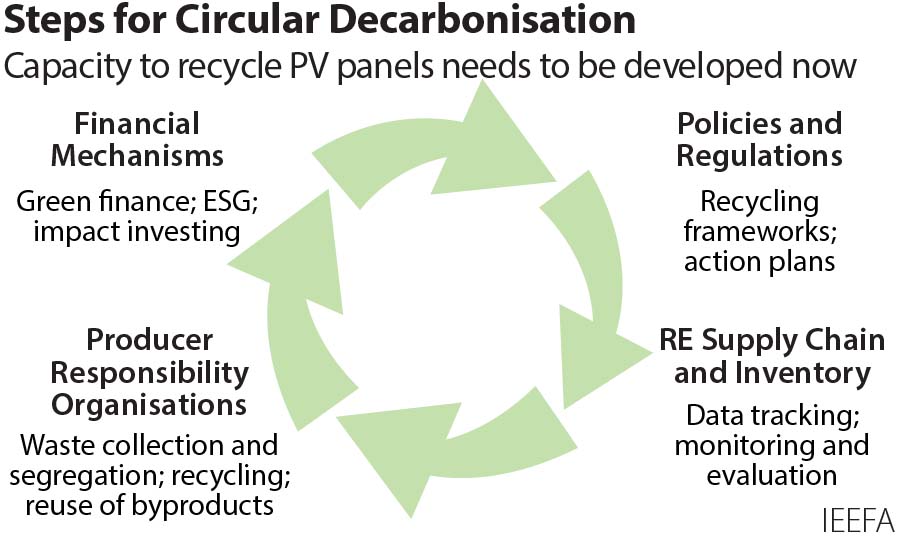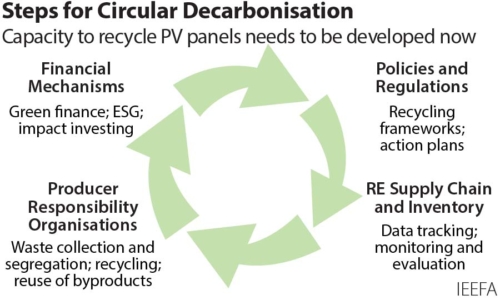IEEFA: A circular economy can support India’s push for clean energy and self-reliance

23 September 2021 (IEEFA India): The adoption of a ‘circular’ approach to managing end-of-life solar photovoltaic (PV) modules, wind blades and batteries would reduce future wastage of the high-value, critical raw materials needed for India’s massive clean energy transition, according to a new report from the Institute for Energy Economics and Financial Analysis (IEEFA).
The report notes India does not yet have a dedicated renewable waste management and recycling policy and calls for a national framework to be developed for domestic recycling of solar PV in particular.
India does not yet have a dedicated renewable waste management and recycling policy
Moving from a linear, ‘make-use-dispose’ model towards one built on circular principles where resources are reused and recycled (or circulated) could have enormous benefits including accelerating decarbonisation of the economy, cutting waste, and reducing dependency on imports of raw materials for domestic solar module manufacturing, according to the report.
With India aggressively deploying renewables to meet its clean energy targets, now is the right time to design an ecosystem that mandates recycling of solar panels and other clean technologies, says author Saloni Sachdeva Michael, energy finance consultant and IEEFA contributor.

A circular approach to decarbonisation can help India make a rapid transition to renewables and build a sustainable, self-reliant economy. In addition to greenhouse gas emissions, the burning of fossil fuels creates vast amounts of harmful waste such as fly ash from coal-fired power plants. Fly ash management costs have serious implications for the share prices of thermal giants.
Decarbonisation based on circular principles is an opportunity to optimise usage of local resources
“Decarbonisation based on circular principles is an opportunity to optimise usage of local resources, which would reduce dependency on imports. It would also reduce the amount of carbon emitted from raw materials used in the manufacture of wind, solar and battery components and minimise waste,” says Sachdeva Michael.
The potential value created by the recovery of raw materials from solar panels globally could reach US$450 million by 2030 and US$15 billion by 2050, according to International Renewable Energy Agency (IRENA) estimates cited in the report.
To make recycling a reality, India will need to take steps to overcome challenges such as how to make solar panel recycling economical.
All stakeholders – policy makers, regulators, manufacturers, assemblers, engineering, procurement and construction (EPC) players, financiers and consumers – need to work together to reduce the costs of recycling, says Sachdeva Michael.
“The growth of solar panel recycling can create new jobs, domestic supply chain stability and ancillary markets that utilise the recycled materials in other products.
“The biggest barriers to implementation are lack of incentives for developers and consumers to give away used solar panels, absence of a structured policy or regulation that defines the ownership of the end-of-life panels and the cost of transporting the panels to the recycling plant.”
Solar panel recycling can create new jobs, domestic supply chain stability and ancillary markets
Learning from global initiatives, India can develop policies and regulations to define the recycling responsibilities and financial ownership of end-of-life solar panels by manufacturers, project developers and consumers.
Extended Producer Responsibility (EPR) schemes, for example, have become a powerful tool for promoting effective waste management solutions in a number of countries. The objective of EPR is to push producers (including thermal power generators, renewable energy developers and manufacturers) to factor in environmental costs as part of their project planning – both technical and financial.
The report outlines recommendations in four key areas to encourage circular principles:
- Policy and regulatory clarity: Establish standards for PV waste collection, treatment, and disposal. Encourage developers and manufacturers to include the cost of decommissioning and recycling of PV panels in the bidding process, in power purchase agreements (PPAs), and in operation and maintenance negotiations. Make it mandatory for government tenders and contracts to include clear directions for the treatment and disposal of existing panels.
- Producer Responsibility Organisations (PRO): Strengthen the capacity of the PROs to include renewable waste collection, segregation, dismantling and recycling.
- Circular supply chain and inventory: Track and monitor solar PV installations to identify and quantify panels nearing end of life and create storage spaces for degraded panels.
- Innovative finance: Develop ancillary markets and pricing mechanisms for recycled products. Encourage the Micro, Small and Medium Enterprises (MSME) sector to play an important role in developing a structured recycling industry. Create a mechanism for adoption of environmental, social and governance (ESG) frameworks to enable domestic manufacturers to attract green finance to set up recycling plants alongside their manufacturing units.
Read the report: Recycle to Repower: Accelerating India’s Clean Energy Transition Through Circular Decarbonisation
Media contact: Rosamond Hutt ([email protected]) +61 406 676 318
Author contact: Saloni Sachdeva Michael ([email protected])
About IEEFA: The Institute for Energy Economics and Financial Analysis (IEEFA) examines issues related to energy markets, trends, and policies. The Institute’s mission is to accelerate the transition to a diverse, sustainable and profitable energy economy. (www.ieefa.org)













